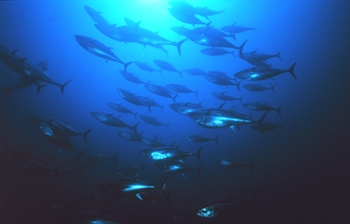Once again, the International Commission for the Conservation of Atlantic Tuna (ICCAT) has flouted warnings from conservationists, evidence from scientists, and even recommendations from the European Commissioner Fisheries and Maritime Affairs in its most recent fishing quota for the Atlantic bluefin tuna. Meeting last week in Paris, ICCAT agreed to a 2011 fishing quota of 12,900 metric tons, 600 less than this year’s quota. Yet, environmentalists from a wide-range of organizations have been warning for years that without a moratorium on bluefin fishing—or at least a drastic reduction in quotas—the species is at risk of extinction. ICCAT’s own scientists say that the current quota gives the species a 70% chance of recovery.
“The word ‘conservation’ should be removed from ICCAT’s name. Governments here have just agreed to a bluefin fishing plan that scientists conclude has a shocking one-third chance of failing to protect the species. Would you get in an airplane or car if you were told that it had a 30 percent chance of crashing?” said Greenpeace International oceans campaigner Oliver Knowles, adding that “this is a monumental failure of the way governments are supposed to protect our oceans.”
 As top predators, bluefin tuna play a vital role in the marine ecosystem. Photo courtesy of NOAA. |
Since 1970 the Atlantic bluefin tuna populations have fallen by 80% due to industrial overfishing, pushing the species to be listed as Critically Endangered by the IUCN Red List. In 2009, ICCAT researchers said a global ban on Atlantic bluefin tuna was justified given that the fish spawning biomass was 15% of its pre-industrial fishing stock. However, delegates defended this year’s quota.
“The actual catch level will be around 11,000, which is a large reduction off current levels,” the head of the Japanese delegation to ICCAT, Masanori Miyahara, told the AFP. Miyahara pointed out that some member nations have stated they wouldn’t fish their full quota. However, the quota ignores the black-market trade in bluefin tuna, which takes thousands of tons of bluefin tuna every year as well.
The European Commissioner for Fisheries and Maritime Affairs in October proposed a quota of 6,000 tons, allowing the bluefin tuna a better chance to recover. However according to media reports, the EU, along with host nation France under pressure from the fishing industry, pushed for a much higher quota and got it.
“Despite sound science to show how threatened these species are—and all the recent evidence of fraud, laundering and illegal fishing—Atlantic bluefin tuna once again were denied the protection they desperately need. ICCAT member governments had more than enough information to act decisively. They failed to do so,” said Dr. Susan Lieberman, director of international policy for the Pew Environment Group, in a press statement.
The bad news for Atlantic bluefin tuna follows a failure to protect the species at the Convention on International Trade in Endangered Species (CITES) this year, largely due to aggressive lobbying by Japan, which alone consumes three-quarters of the trade.
An analysis last year by WWF predicted that the Atlantic bluefin tuna population in the Mediterranean will become functionally extinct by 2012 if the fishery isn’t closed. According to the report Mediterranean bluefin breeding population’s were cut in half between 2002 and 2007, while the size of breeding fish also fell by half over fifteen years.
Related articles
History repeats itself: the path to extinction is still paved with greed and waste

(04/05/2010) As a child I read about the near-extinction of the American bison. Once the dominant species on America’s Great Plains, I remember books illustrating how train-travelers would set their guns on open windows and shoot down bison by the hundreds as the locomotive sped through what was left of the wild west. The American bison plunged from an estimated 30 million to a few hundred at the opening of the 20th century. When I read about the bison’s demise I remember thinking, with the characteristic superiority of a child, how such a thing could never happen today, that society has, in a word, ‘progressed’. Grown-up now, the world has made me wiser: last month the international organization CITES (Convention on International Trade in Endangered Species) struck down a ban on the Critically Endangered Atlantic bluefin tuna. The story of the Atlantic bluefin tuna is a long and mostly irrational one—that is if one looks at the Atlantic bluefin from a scientific, ecologic, moral, or common-sense perspective.
Already Critically Endangered, bluefin tuna hit hard by BP oil disaster
(10/19/2010) Using satellite data from the European Space Agency, researchers estimate that over 20% of juvenile Atlantic bluefin tuna in the Gulf of Mexico were killed by the BP oil spill. Although that percentage may not seem catastrophic, the losses are on top of an 82% decline in the overall population over the past three decades due to overfishing. The population plunge has pushed the International Union for the Conservation of Nature (IUCN) to categorize the fish as Critically Endangered, its highest rating before extinction.
Quota filled, bluefin tuna hunt ends early
(06/09/2010) The European Commission (EC) has announced an early end to the Atlantic bluefin tuna season since the quota of 13,500 tons has been met. The fishing will end at 11:59 tonight GMT.

(06/07/2010) Things have become ugly in the Mediterranean: over the weekend, fishermen and Greenpeace activists squared off over the fate of the Critically Endangered bluefin tuna. One run-in, in which Greenpeace worked to free tuna from fishermen’s nets, left one activist in the hospital after a fisherman sunk a hook in the activist’s leg. Meanwhile, the Sea Shepherd Conservation Society has announced a ‘Blue Rage’ campaign that will target illegal fishing of bluefin tuna.
Critically Endangered bluefin tuna receives no reprieve from CITES
(03/18/2010) A proposal to totally ban the trade in the Critically Endangered Atlantic bluefin tuna failed at the Convention on International Trade in Endangered Species (CITES), surprising many who saw positive signs leading up to the meeting of a successful ban.